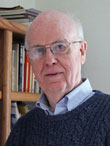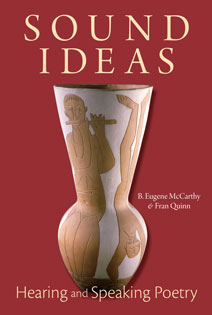Sound Ideas: Hearing and Speaking Poetry
by B. Eugene McCarthy and Fran Quinn
Finalist in ForeWord Reviews' 16th Annual Book of the Year Awards!
Hearing and speaking are essential to making poems live. Poems are a physical experience. This book explains how to find your way to the heart of a poem by taking it off the page.
The authors have taught poetry successfully with this method for many years, and now they share it beyond their own classrooms.
“Hard to believe that anyone serious about poetry, either student or teacher, wouldn’t want to own this book. Reading Sound Ideas is like being in a class with the best poet and teacher of your life. McCarthy and Quinn are those poet teachers, each having fallen in love with poetry, each having given over their lives to its beauty and power. And this book is that classroom, one which comes alive with force and pleasure, with their shared belief that poetry itself comes truly alive when one speaks and hears it, when it enters the consciousness through that breath and release, when it has the power to change lives. This book offers something new and necessary in the study of poetry."
—John HodgenVisit the Sound Ideas website.

About the AuthorS
B. Eugene McCarthy has a degree in English and a Master’s from the University of Detroit. He took his PhD at the University of Kansas in 1965. He taught a full range of undergraduate courses at Holy Cross College until his retirement in 2000. His focus was on Restoration and Eighteenth Century drama, and his first book was William Wycherley: A Biography, followed by William Wycherley, A Reference Guide.
His interest then moved toward poetry of the 18th Century and he began teaching first-year, introductory courses in poetry, teaming with Fran Quinn to develop an approach to poetry that also informed upper-level literature courses.
As a visiting scholar at Clare Hall at Cambridge University, he researched his book Thomas Gray: The Progress of a Poet. Several other publications came out of his study of Gray.
While publishing in African-American literature on Richard Wright and Toni Morrison, his most recent work was co-edited with Thomas L. Doughton, From Bondage to Belonging: The Worcester Slave Narratives, an edition of eight narratives by ex-slaves who lived in Worcester. He has been an editor of The Worcester Review and participates in the Milton Ensemble which offers dramatic performances of books of Paradise Lost each year.
 Fran Quinn has a bachelor’s degree from Assumption College and an ABD from U. Mass, Amherst. He taught literature in high schools and in colleges in New England for many years. His interest was always in finding innovative ways to teach poetry to students at various levels—ways to allow the students to discover and learn, and bring them inside poems, not keep them outside, without emotional engagement.
Fran Quinn has a bachelor’s degree from Assumption College and an ABD from U. Mass, Amherst. He taught literature in high schools and in colleges in New England for many years. His interest was always in finding innovative ways to teach poetry to students at various levels—ways to allow the students to discover and learn, and bring them inside poems, not keep them outside, without emotional engagement.
Most important to this teaching is that he is a poet himself; he published three volumes of poetry, Milk of the Lioness (1982), The Goblet Crying for Wine (1995), and A Horse of Blue Ink (2005), and has placed poems in various journals. In 2002, The Worcester Review produced a special issue for his 60th birthday with forty tributes by such poets as Robert Bly, Eavan Boland, Coleman Barks, Seamus Heaney, and Galway Kinnell. Robert Creeley says, “Fran has been and is the best news possible”; says Donald Hall, “No one has worked so hard for poetry as Fran Quinn. No one has benefitted more poets, with his diligence, his warm heart, and his inventiveness.”
One of the founders of the Worcester County Poetry Association in 1971, he organized Robert Bly’s Mother Conference for years. In addition to teaching creative writing for over twenty-five years, he was the poet-in-residence and director of the internationally known Visiting Writers Series at Butler University, Indianapolis, Indiana for fifteen years, a series that brought in 500 poets worldwide. He now conducts regular poetry workshops in Indianapolis, Chicago, New York City, and elsewhere. Visit his website at franquinnworkshops.com.





